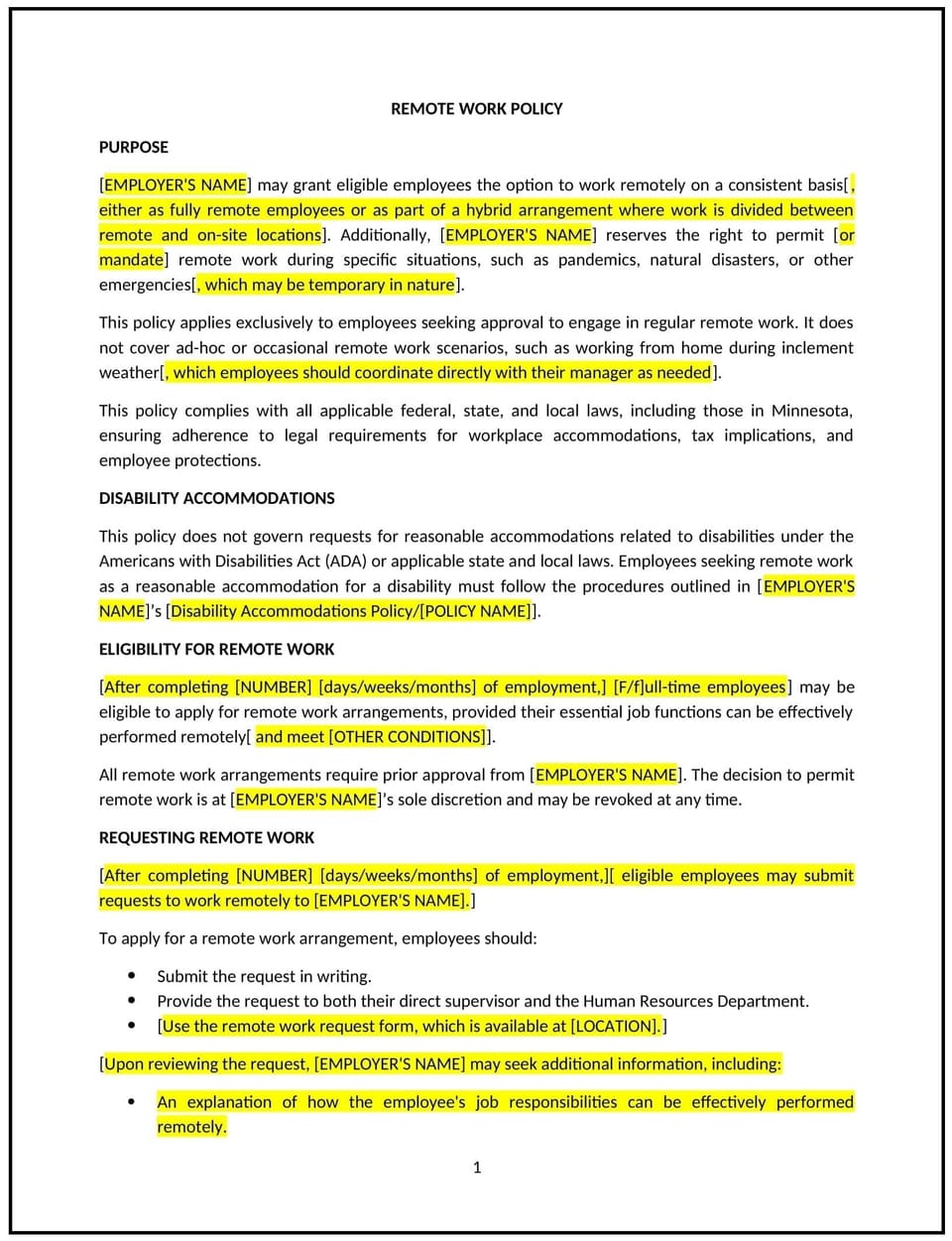Remote work policy (Minnesota): Free template

Remote work policy (Minnesota)
This remote work policy is designed to help Minnesota businesses establish clear guidelines for employees working outside the traditional office environment. Whether businesses are managing fully remote teams, hybrid work arrangements, or occasional work-from-home days, this policy provides a framework to promote productivity, communication, and work-life balance. Tailored to Minnesota’s workforce dynamics, this policy emphasizes flexibility, accountability, and the use of technology to support remote work.
By implementing this policy, businesses in Minnesota can attract and retain talent, reduce overhead costs, and maintain operational efficiency in a remote or hybrid work environment.
How to use this remote work policy (Minnesota)
- Define eligibility: Clearly outline which roles or employees are eligible for remote work, based on job responsibilities and business needs.
- Establish expectations: Provide guidelines for work hours, availability, communication, and performance standards for remote employees.
- Address equipment and technology: Specify whether the business will provide equipment (e.g., laptops, software) or reimburse employees for necessary tools.
- Set communication protocols: Outline preferred tools and methods for communication, such as email, messaging platforms, or video conferencing.
- Include security measures: Provide guidelines for protecting sensitive information, such as using secure networks, VPNs, and password management.
- Address workspace requirements: Encourage employees to set up a dedicated, ergonomic workspace to support productivity and well-being.
- Review and update the policy: Regularly assess the policy’s effectiveness and make adjustments as needed to reflect changes in business needs or workforce trends.
- Communicate the policy: Share the policy with employees during onboarding and through internal communications to ensure awareness and understanding.
Benefits of using this remote work policy (Minnesota)
This policy offers several advantages for Minnesota businesses:
- Attracts and retains talent: Offering remote work options makes the business more appealing to job seekers and helps retain current employees.
- Reduces overhead costs: Remote work can lower expenses related to office space, utilities, and supplies.
- Enhances productivity: Many employees report higher productivity when working remotely due to fewer distractions and flexible schedules.
- Supports work-life balance: Remote work allows employees to better manage personal and professional responsibilities, improving job satisfaction.
- Promotes inclusivity: Remote work can accommodate employees with disabilities, caregiving responsibilities, or other unique needs.
- Builds trust: A clear and fair remote work policy fosters trust and accountability between employees and management.
- Aligns with modern trends: Remote work reflects evolving workplace preferences and technological advancements.
Tips for using this remote work policy (Minnesota)
- Communicate the policy effectively: Share the policy with employees during onboarding and through regular training sessions.
- Provide necessary tools: Ensure remote employees have access to the equipment, software, and support they need to perform their roles effectively.
- Encourage regular check-ins: Schedule regular meetings or check-ins to maintain communication and address any challenges.
- Be flexible: Allow for adjustments to work hours or arrangements to accommodate employees’ personal needs and time zones.
- Monitor performance: Focus on outcomes and deliverables rather than micromanaging remote employees’ daily activities.
- Review the policy periodically: Update the policy as needed to reflect changes in business needs, workforce trends, or technology.
Q: Why should Minnesota businesses adopt a remote work policy?
A: Businesses should adopt this policy to attract and retain talent, reduce overhead costs, and support productivity in a remote or hybrid work environment.
Q: Who is eligible for remote work under this policy?
A: Eligibility should be clearly defined, typically including employees whose roles can be performed effectively outside the traditional office environment.
Q: What equipment and technology should businesses provide?
A: Businesses should provide or reimburse employees for necessary tools, such as laptops, software, and secure communication platforms.
Q: How should businesses ensure effective communication with remote employees?
A: Businesses should establish preferred tools and methods for communication, such as email, messaging platforms, or video conferencing.
Q: What security measures should remote employees follow?
A: Remote employees should use secure networks, VPNs, and password management tools to protect sensitive information.
Q: How can businesses support remote employees’ well-being?
A: Businesses should encourage employees to set up ergonomic workspaces and provide resources for mental health and work-life balance.
Q: How often should the policy be reviewed?
A: The policy should be reviewed annually or as needed to reflect changes in business needs, workforce trends, or technology.
This article contains general legal information and does not contain legal advice. Cobrief is not a law firm or a substitute for an attorney or law firm. The law is complex and changes often. For legal advice, please ask a lawyer.


